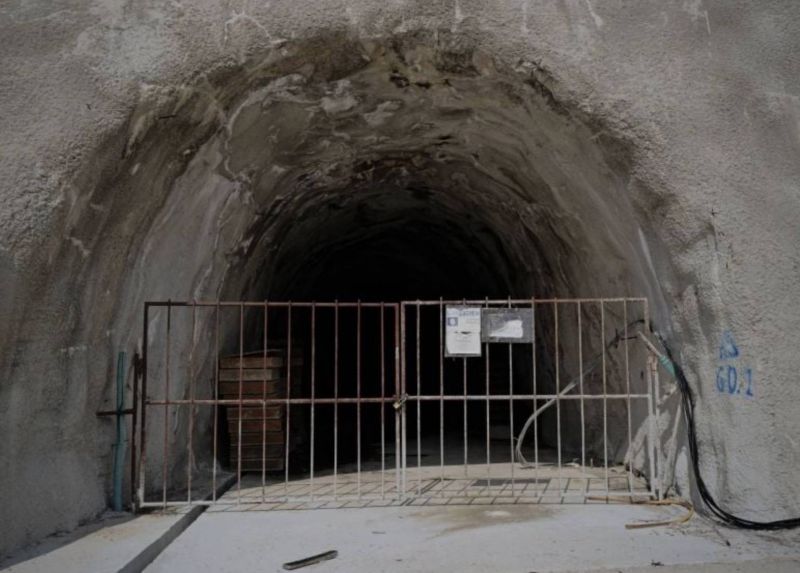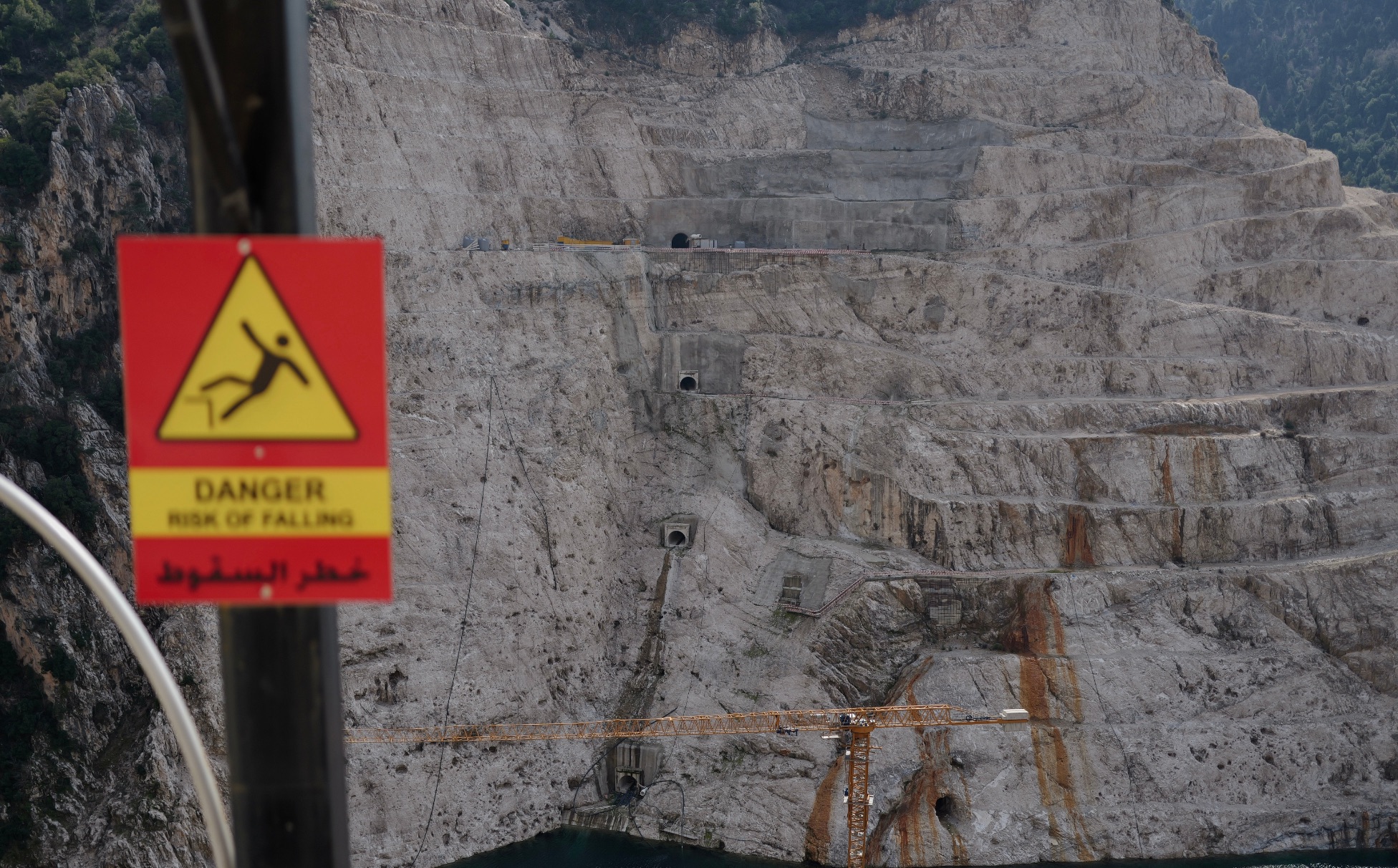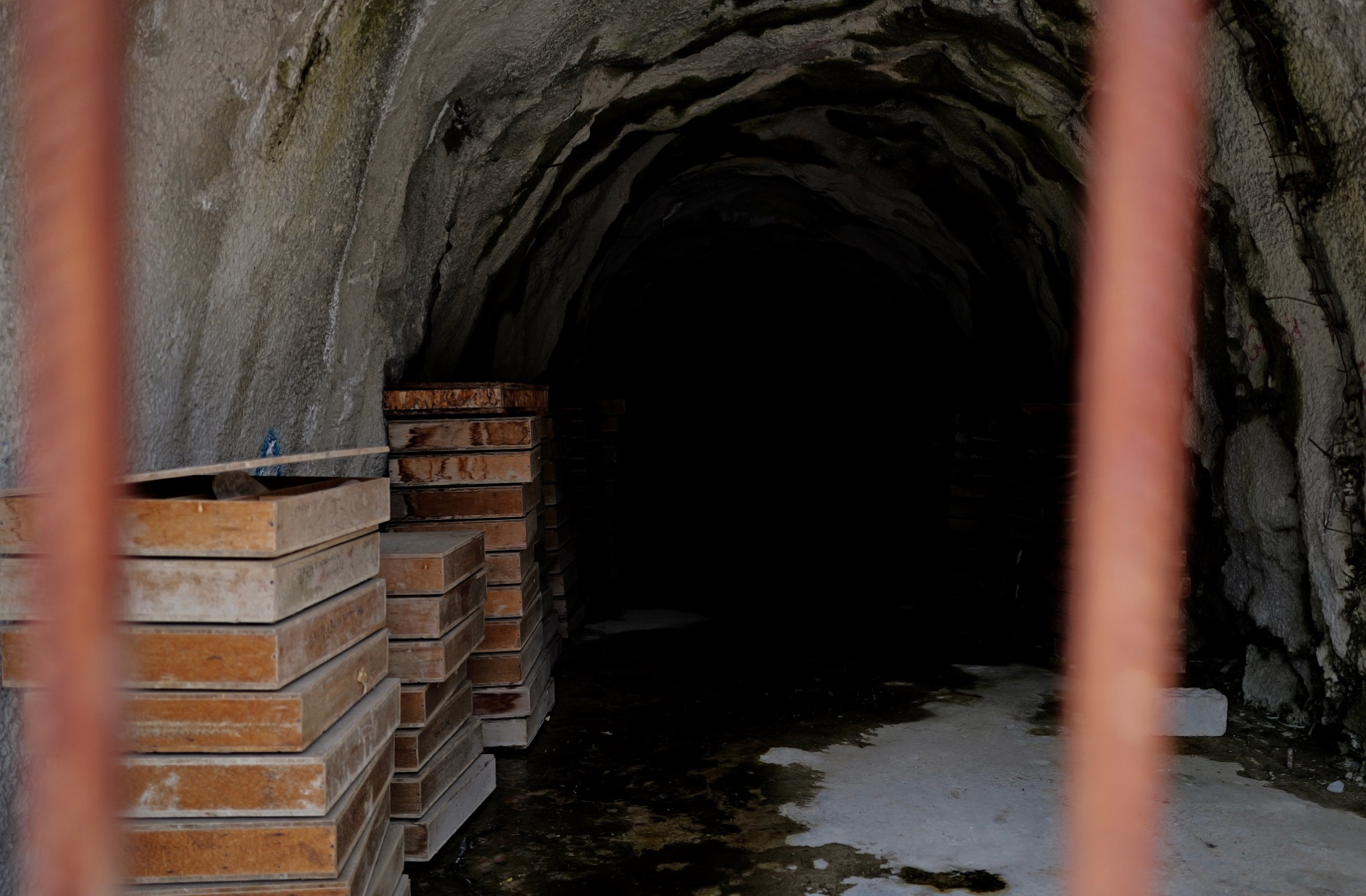
The entrance of a tunnel dug for the Janneh dam, in the heights of Jbeil, Lebanon, Feb. 27, 2024. (Credit: Matthieu Karam/L'Orient-Le Jour)
On a rugged unpaved road, just a dozen hairpin turns separate the predominantly Christian village of Qartaba, sitting 1,250 meters high on the Jbeil heights, from the depths of the Janneh valley. Here, amidst the quiet, stands a controversial dam project, halted since 2020 due to funding issues within the Ministry of Energy and Water.
In this secluded area, nearly deserted since construction ceased, a dozen tunnels carved into the mountain — typical for such projects — have sparked recent debates on social media and in political circles.
A video from an Israeli research center suggested that Hezbollah could exploit this valley, situated approximately 120 kilometers from the Israeli border, as a launchpad for long-range missiles aimed at Israel, and seek refuge in the tunnels.
However, the credibility of the Alma Research and Education Center’s video, dating back to June 2023, remains questionable.
It reemerged on social media in mid-February, stoking fear among Hezbollah’s opponents and coinciding with ongoing warfare in southern Lebanon since the outset of the Gaza conflict on Oct. 7.
 View of the Janneh dam. (Credit: Matthieu Karam/L'Orient-Le Jour)
View of the Janneh dam. (Credit: Matthieu Karam/L'Orient-Le Jour)
“Construction of the dam began in 2013, followed by tunnel excavation in 2016,” said Ramzi Saliba, an engineer from the Beirut and Mount Lebanon Water Office (EBML), in an interview with L’Orient-Le Jour. “These tunnels serve as drainage channels along the mountainsides surrounding the dam.”
On the premises, two unguarded tunnels flank the roadside, sealed off from public access by padlocked metal barriers. The depths of these tunnels, ranging between 60 to 70 meters, remain obscured from view, as confirmed by the engineer.
At the entrance, wooden crates sit, containing samples of soil and cement. “These are provided to allay concerns regarding the presence of any military equipment,” said Saliba.
‘Another Beirut port scenario’
A few days ago, in the aftermath of the controversy, the Energy Ministry issued a statement confirming that the tunnels were excavated by the EBML. However, political figures antagonistic to Hezbollah remain unconvinced and continue to demand clarifications and assurances.
“We are amidst a time of war, and people are gripped by fear,” said Fares Souhaid, a former MP from Qartaba and a staunch adversary of Hezbollah. “After the August 2020 Beirut port explosion, [people] can no longer fathom living in a potential powder keg.”
While acknowledging that the tunnels were indeed constructed by the Water Office, Souhaid persists in his call for transparency.
“The Lebanese Army and the government must disclose the truth to us,” he said. “If our villages are situated atop a powder keg, we have the right to be informed.”
“We reject the prospect of another Beirut port [scenario].”
“Clearly, the tunnels at the Janneh dam are not owned by Hezbollah,” said Ziad Hawat, MP for the Lebanese Forces (LF) in Jbeil. “However, whether the party exploits them for its benefit is another matter.”
“The security services must conduct thorough investigations into these tunnels, “ Hawat said. “This issue extends beyond the residents of Jbeil, it concerns the entirety of Lebanon,” Hawat added, urging the media to refrain from sensationalizing the matter.
“There is nothing remarkable about the Janneh dam,” said a source within the Army’s intelligence services on condition of anonymity. When asked if the Army had inspected the tunnels on-site, the source responded, “We remain informed without the necessity for physical inspections.”
“The authorities responsible for the dam denied these claims, as have the presidents of the relevant municipal councils,” Hezbollah spokesperson Mohammad Afif Naboulsi, told L’Orient-Le Jour. “Media investigations conducted on-site corroborated these denials.”
Echoing this sentiment, Raed Berro, Hezbollah MP for Jbeil, said “The Israelis aim to sow discord among the Lebanese.”
“They released this video once, but failed to achieve their objectives,” he added. “Hence, they circulated it again on social media.”
‘Intimidation’
In Qartaba, residents who openly express their opposition to Hezbollah also appear to support this perspective.
“We have never witnessed any weaponry here,” said Sassin Sherfan, a 54-year-old baker in the village square, which typically remains quiet during the winter months. “We coexist peacefully with our Shiite brethren.”
According to Sherfan, these tunnels are solely associated with the dam, a fact widely acknowledged within the community. “There are no arms,” said Sherfan, who views the situation as an “intimidation” tactic by Israel.
 Wooden boxes in front of another tunnel connected to the Janneh Dam. (Credit: Matthieu Karam/L'Orient-Le Jour)
Wooden boxes in front of another tunnel connected to the Janneh Dam. (Credit: Matthieu Karam/L'Orient-Le Jour)
“Some of my friends who worked at the dam site never encountered any Hezbollah members there,” said Joe Hannah, 26, from his construction tool shop. “This area isn’t sympathetic to Hezbollah. It’s mostly Christian.”
“The Israelis shared this video, possibly aiming to sow discord between Christians and Shiites,” he added.
A few dozen meters away, Toubia Daoud, a butcher, places his faith in divine providence. “Saint Charbel is watching over us,” he said.
“What concerns me is the potential collapse of the old structures if Israeli aircrafts fly over the village or launch a missile,” he added while slicing meat behind his shop window which donned a portrait of the late president and LF founder, Bachir Gemayel.
“We harbor no fear of Israel or Hezbollah,” Daoud said. “If death comes, it is because our time has arrived.”
‘A military idiot’
Is the Janneh Valley and its tunnels strategically significant for Hezbollah from a military perspective?
“The terrain surrounding the tunnels and the access roads are not suitable for resistance operations,” said retired General Amin Hoteit, known for his association with Hezbollah.
“Storage facilities for missiles and ammunition must adhere to stringent standards, especially concerning humidity and space,” he said. “These tunnels fail to meet these criteria.”
“Only a military novice would consider storing weapons there,” Hoteit added.
Despite his staunch opposition to Hezbollah, former General Khalil Helou appears to align with Hoteit’s perspective. “It’s implausible to store anything in the depths of this valley,” he said.
“Consider how a truck hauling a missile could even navigate through there,” Helou added. “The Israelis are essentially signaling to Hezbollah: ‘We’re aware of your intentions.’“
He went on to say, “We’re discussing potential missile launch sites, not established bases. The secondary objective is to exert psychological pressure on Hezbollah and induce panic among the populace.”
‘We bury on other people’s land’
The Shiite community in the hills above Jbeil is a well-established presence. Villages such as Lassa, Afqa, Qoroqraya, Almat, and others have been home to Shiites for generations.
While occasional sectarian tensions flare up over land disputes, these communities are not new to the area’s landscape.
Additionally, flags representing Hezbollah and Amal are prominently displayed, no longer concealed from view.
“Since 2000, Hezbollah has wanted to expand in the Jbeil area, where it has a presence in well-established Shia villages that are part of the social fabric,” said Souhaid.
“Hezbollah-supported Shiite farmers began in 2000 to create a state of affairs in which people bury on other people’s land, build on other people’s land and cultivate on other people’s land,” he said, calling it a “political issue.”
For Father Charbel Beyrouti, superior of the Saint Sarkis and Bakhos monastery in Qartaba, the area is no longer what it used to be.
“Hezbollah and Amal have entrenched themselves here,” Beyrouti said. “Their presence, once subtle, is now conspicuous. Hezbollah flags and portraits of [party leader] Hassan Nasrallah are visible.”
He added that his criticism is directed at the political parties rather than the Shiite community.
Hezbollah, on its part, asserts that its focus remains on other fronts.
“Our concern, as the resistance, primarily lies along the [southern] border,” said Berro. “We have no intention of engaging in such activities in the Jbeil area.”
He believes that “the Israelis seek to sow division and discord.”
This article was originally published in French in L'Orient-Le Jour. Translation by Sahar Ghoussoub.